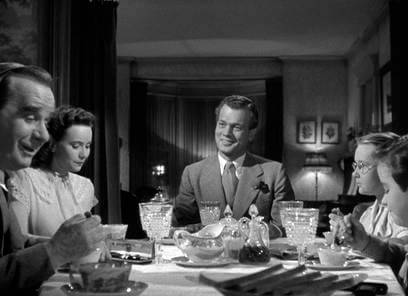

The ending underscores the theme of how small-town life can seem so innocent when in reality darkness dwells below the surface. Again, Cotton steals the scene in his monologue dismissing Charlie’s life and her “peaceful, stupid dreams.”

The scene in which Uncle Charlie and his niece meet at the bar is thick with tension. There is also the scene where Cotton speaks with clear disgust about rich widows, who are fat and lazy like overfed cattle - thoughts that get a rise out of Charlie. The clever use of The Merry Widow Waltz is only one of the unique devices that distinguishes this film noir/thriller as a great movie. The more of a threat Charlie becomes, the greater her chances of being bumped off having an unfortunate accident. And Charlie is placed in the precarious position of knowing the truth (especially after being approached by the two cops pursuing her uncle - one of whom provides a convenient love interest for her) and trying to … well … dislodge him permanently from the community. Hitchcock concocts a situation in which a thoroughly corrupt man breezes into a small town, takes it by proverbial storm, and comes out smelling like a rose to the unwitting masses.

They’re like twins, you know, to the point of being telepathic.Īnd Uncle Charlie throws money about like it’s going out of style and bestows gifts on the family, including an emerald ring for Charlie (the niece) that ends up telling way more than she wanted to know about her uncle. Uncle Charlie seeks refuge in the small town of Santa Rosa, California, with his (slightly ditzy) sister and her family. Uncle Charlie, is in a tight spot and has been up to no good. Shadow of a Doubt opens with a shot of Charles Oakley (played with all due smarmy creepiness by Joseph Cotton) in a bedroom, lying in bed with lots of money. Right away, it’s obvious Oakley, a.k.a.


 0 kommentar(er)
0 kommentar(er)
